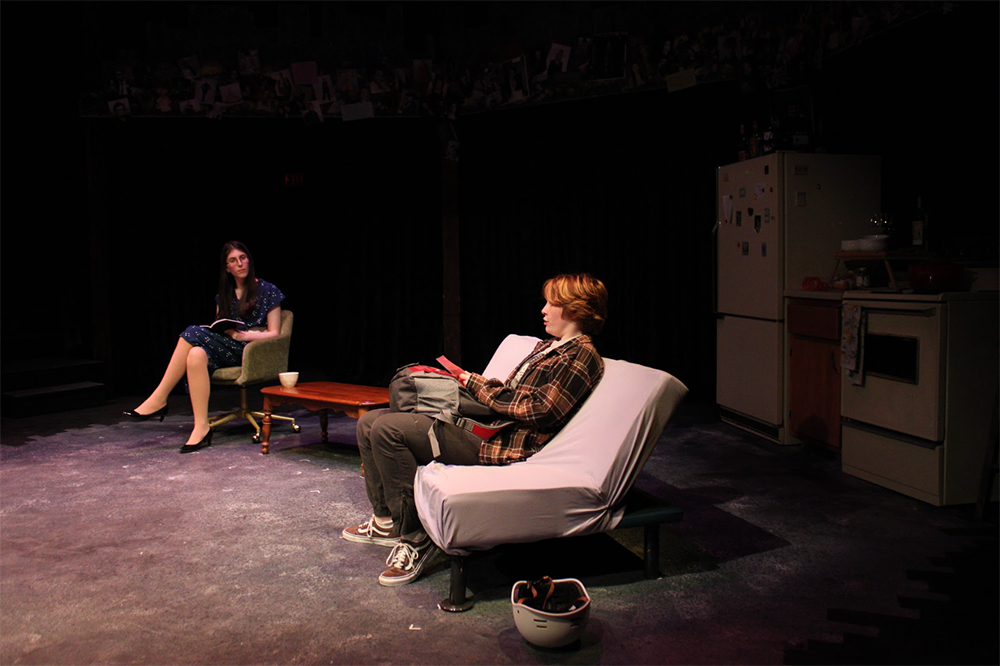On Feb 16. The University of Maine McGillicuddy Humanities Center helped host the production of the play “F2M.” The show ran from Feb 16 to 19 at the Cyrus Pavillon Theater. The production was directed and put together by Bell Gellis, a fourth-year psychology, theater and WGS triple major from São Paulo, Brazil.
This is Gellis’ first time directing and as production manager.
“F2M by Patricia Wettig is a dark comedy following the life of Parker as he navigates parents’ weekend when his not so accepting parents show up on a surprise visit.” Gellis said.
The main character Parker, transitioning from female to male, is currently going through the beginning part of gender reassignment. Their parents on the other hand are not too stoked about the whole idea of their daughter becoming a male.
“The topic at hand in this show is one currently being questioned in today’s political atmosphere and can be a guide to a deeper emotional understanding of another person’s experience and life,” Gellis said. “My personal mission in directing is to shed light on forgotten and marginalized stories.”
The production is part of a psychology research project that Gellis is working on for their Capstone. Audience members were asked at the end of the show to scan QR code and fill out a form about the show.
“I have been workshopping this project since March of last year, and began seriously working on it in October. The cast includes Kilee McAtee, Gracie Farrar, Juliana Gudaitis, David Olski, Katie Brayson and Jess Baran. Designers include Laura Garfien, Travis Burt, Sophie Bilodeau, Katie Brayson [and] Emily Voight. Crew includes Sarah Cacciapouti, Erin Ciampa, Vanessa Schaeffer, Iris Loehr and Sam Campagna,” Gellis shared.
The show was well done. The actors did a phenomenal job with only minor fumbling of words here and there which ultimately only added to their character. McAtee made an incredibly emotional performance as Parker, often carrying the scene. There were moments where the character would be speaking to their parents, but the lights would go down and they would be facing the audience speaking to us as if their parents wouldnt understand and they wanted at least some group of strangers to understand them. Olski’s role as Clarence Parker was stunning and was tasked with saying the harshest lines of the show. He would often deadname his child and have trouble referring to them with the proper pronouns, showing how he is in denial about the whole situation. He would talk over his wife Ali, portrayed by Gudaitis, which showed that there were more problems at hand than just their child. Gudaitis played a perfect actress mother while Brayson stole the show with her portrayal of Linda Lou. She entered the scene like a hurricane and was great throughout the rest of the show. Baran had a small role as Parker’s therapist, but the scenes were impactful and drove the point home due to their ability to listen and explain to the audience in lay terms what was happening.
The cast had an incredible sense of chemistry with one another. This made scenes such as the big fight scene where Clarence was attacking Parker’s girlfriend even more emotional and resonated with the audience. People went silent often, but with a little humor here and there we felt comfortable with the subject matter again. The writing really makes or breaks productions and this show had incredible writing that paired with the actors made the show worthwhile.
“This has been such an important journey and great learning process. I couldn’t have asked for a better group of people to transform this play and bring it to life. The cast and crew have been by my side in putting this together and making it a wonderful experience,” Gellis said.
“Theater has often been a place that people turn to when they feel outcast[ed] or misunderstood. It tends to be a more accepting place, though it does still very much have its flaws. Plays can often be written more liberally as the purpose isn’t always to sell (make money) but rather to feel or make people feel. That being said, many plays, like F2M, get left off the shelves and stories like Parker’s don’t get to see the stage lights,” Gellis said.
The time paid off and what was left was a show that made the subject of gender easier to understand, even if it left off with questions to be asked, we can see that Parker is going to have a bright future in front of them.
Starting next week is Maine Masque Showcase Week. This year they are putting on Daigs Daigneault’s show “Face Value.” Performance dates are Feb. 23 to 24 at 7 p.m. and Feb. 26 at 2 p.m. at Hauck Auditorium.










